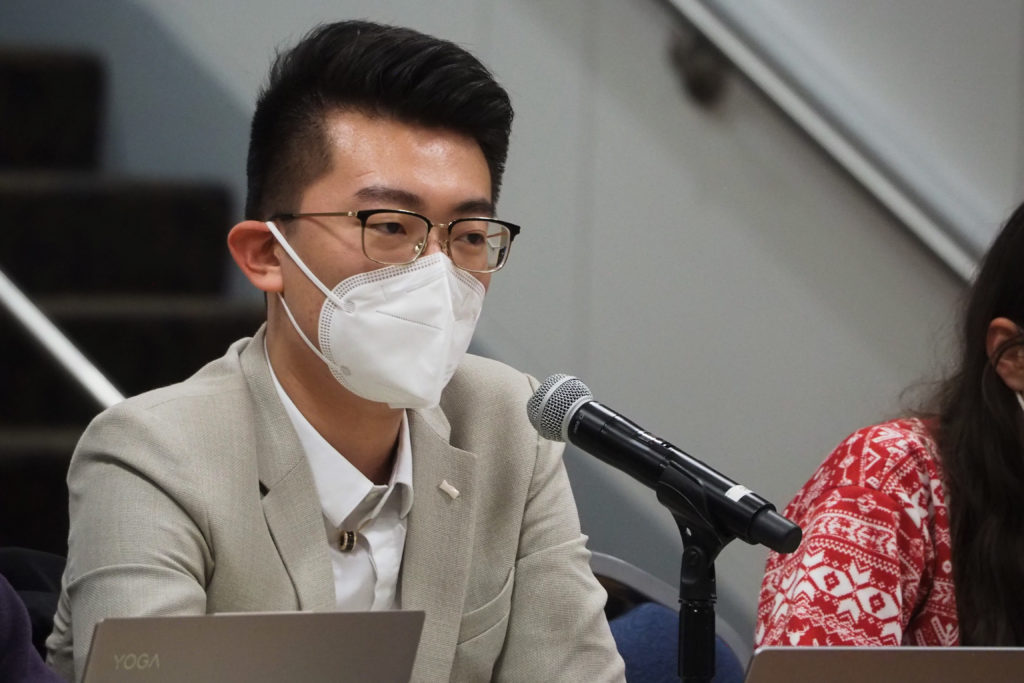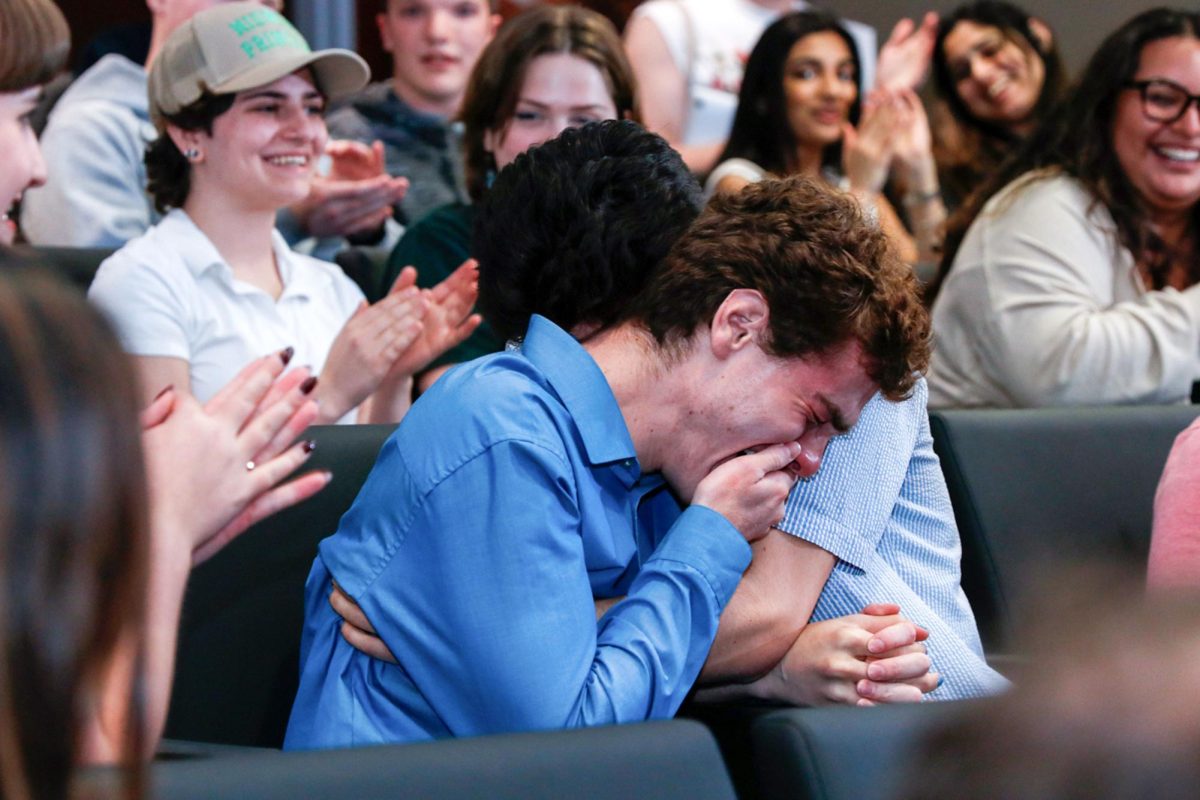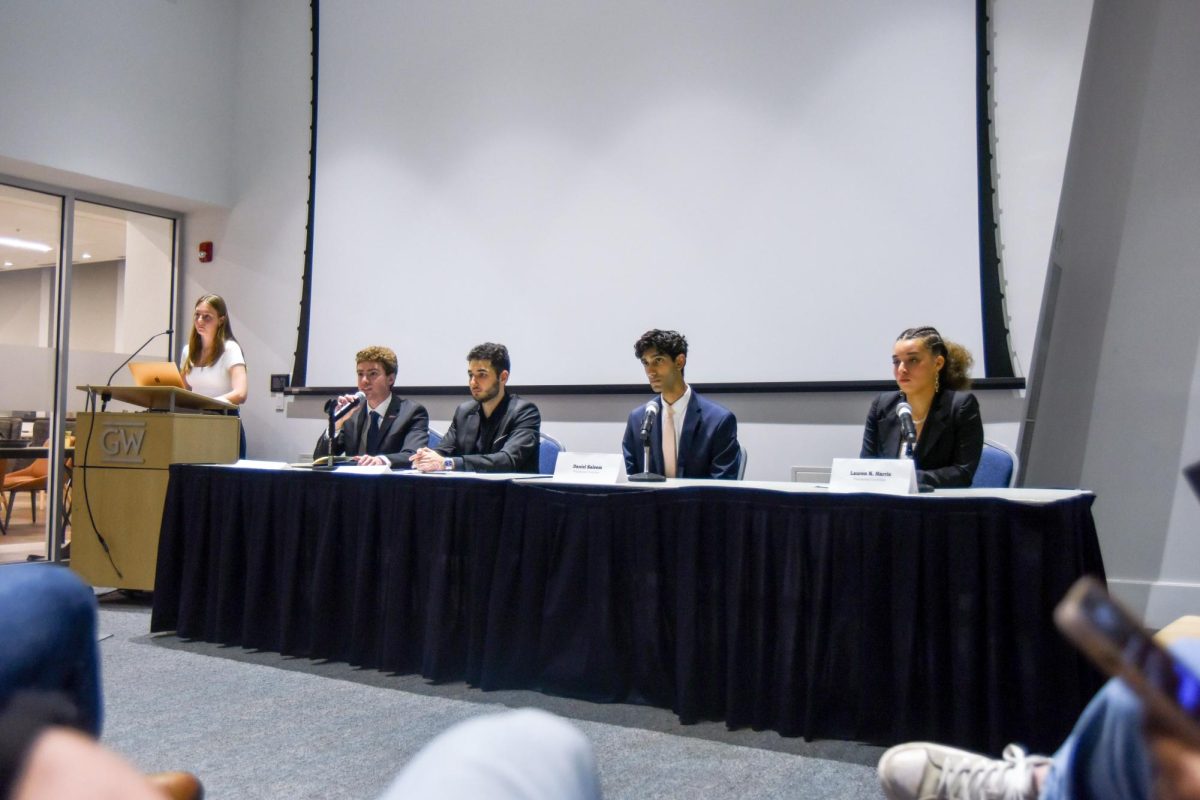The Student Association Senate voted to recognize outgoing University President Thomas LeBlanc for his leadership since 2017 at its last meeting of the semester Monday.
The senate passed the President LeBlanc Recognition Act to recognize LeBlanc’s accomplishments during his tenure at GW just more than a year after the body demanded his resignation. SA Sen. Yan Xu, ESIA-U, said he sponsored the resolution to ease “tension” between administrators and students and to offer an act of “good faith” to officials.
“That’s the main reason I put through this resolution,” Xu said in a statement to The Hatchet. “It basically shows the current administration and future administration, you can work with us.”
Xu said while the resolution did not negate some of the more negative aspects of LeBlanc’s term, the senate already took action in the past to point out past “mistakes,” like the hiring of Heather Swain and LeBlanc’s use of a racially insensitive remark.
The resolution passed with at least two senators opposing. SA Vice President Kate Carpenter did not return a request for comment on the official vote count.
SA Sen. Sofia Packer, U-at-Large, partially read a statement voicing opposition to the bill before Grace Pedersen, the senate parliamentarian, called her “out of order.” Packer said passing the resolution means the senate is “ignoring the great harms” that LeBlanc caused throughout his tenure.
“I understand that it may be standard practice to do things a certain way,” Packer said. “But I think we open ourselves up to a lot of these same harms if we continue to follow a standard for a president who has been involved in so many problems at this University throughout his years.”
Carpenter, the SA vice president, announced plans for President’s Weekend Palooza, a multi-day University-wide event during President’s Day weekend in February. Carpenter said the occasion will include four main events leading up to a basketball game at the end of the weekend, and senators are welcome to serve on the planning committee for the weekend.
“This weekend will serve as a time to experience new and exciting events while rallying around school spirit and culture,” Carpenter said. “We are excited for what is in store.”
The senate passed a special resolution at the meeting to allocate $18,775 of the SA’s general fund to the Black Student Union to help cover the cost of its Black Heritage Celebration events, which also take place in February during Black History Month. BSU did not request any SA funding for BHC last February as the events were completely online, but the SA doled out $29,000 for the event in 2020.
During an executive session to discuss the resolution, senators unanimously voted to remove SA Sen. Dasia Bandy, ESIA-U, from the session and advised her not to vote on the resolution after determining her current membership with BSU as a conflict of interest. Bandy said she did not feel her membership was significant enough to warrant her removal from voting and her input on BHC would have been “valuable” in the decision to allocate funds to the celebration.
“I don’t speak to the BSU for any personal or professional reasons on a day-to-day basis for it to be a conflict of interest,” Bandy said. “But unanimously, based off of the senate, it was considered biased.”
Pedersen, the senate’s parliamentarian, said senators who are current or former members of organizations should recuse themselves from discussion and voting on those organizations.
Bandy was the only senator to abstain from voting on the BHC resolution.
The senate also unanimously passed the Civic Day of Service Election Day Act, a resolution calling on GW to cancel classes and declare a “Civic Day of Service” every two years on Election Day.
The senate unanimously passed the Inclusive Transportation Act, a resolution urging the University to ask the Washington Metropolitan Area Transit Authority to include part-time law students in the U-Pass program.
The Student Bar Association Senate passed a similar resolution last month calling on the University to include part-time students in U-Pass, which provides unlimited rides to undergraduates at a rate of $100 per semester, while full-time graduate students can choose whether to participate in the program.
SA Sen. Cody Ingraham, Law-G and the sponsor of the resolution, said law students who are enrolled in similar credit hours at other universities with U-Pass have been allowed to enroll. Carpenter responded to these concerns in a meeting last month, saying WMATA sets a policy restricting U-Pass enrollment to full-time students, so GW did not choose to exclude part-time students.
The senate unanimously passed the GW Men’s Rowing Varsity Reinstatement Act, which urges GW to reinstate the varsity status of men’s rowing after the University cut the program and six other varsity teams at the end of last academic year.
Senators also unanimously passed three bills updating the SA’s bylaws at the meeting.
The first revises the SA’s financial allocation process. Under the legislation, the executive and legislative branches must request remaining money from the SA’s general fund for the three branches’ use after members of the financial services and allocations committee finish handing allocations to graduate umbrella organizations.
The branches together may receive either 5 percent or $40,000 – whichever is the highest total – from the fund, according to the legislation. The judicial branch will receive $300 of that sum for the fiscal year, according to the bill.
The bill states that the branches formerly would automatically receive the remaining cash from the general fund without any formal request process, with the executive branch receiving two-thirds and the legislative branch receiving one-third.
The legislation also clarified the budget hearing process that the financial services and allocations committee holds for student organizations.
The University cut the SA’s budget by about $100,000 this fiscal year. Xu, the finance committee chairperson, said the SA’s finance committee approved about $15,000 dollars for 24 co-sponsor applications since Nov. 15, including a $1,584 allocation to the GW Panhellenic Association for its formal recruitment period.
The second bill codified the bylaws with the results of a referendum that students passed last month to switch ranked-choice voting in multi-seat senate elections with plurality-at large voting.
The third bill updated the bylaws to allow the SA to host a University-wide contest to redesign the SA emblem with the image falling under the executive branch’s jurisdiction, which the legislation expanded.
Senators also filled the two existing vacancies on the senate at the meeting. The senate confirmed first-year graduate student Kiley Mulligan to a Milken Institute School of Public Health at-large seat and junior Chloe Wagner, the former Joint Elections Commission chair, to an undergraduate Columbian College of Arts and Sciences seat.
Chief Financial Officer Mark Diaz, who delivered a report to the SA, said GW’s $22 million three-year plan to enhance campus accessibility across its buildings will include the Lerner Health and Wellness Center, which is set to shut down for part of 2022 for roof repairs and HVAC renovations. Diaz said officials would use the $22 million to address a $300 million overall deferred maintenance backlog – a process when officials implement facilities and maintenance updates that are most affordable and top priorities for the University.
Lauren Sforza and Isha Trivedi contributed reporting.







